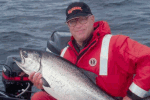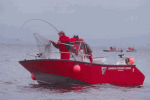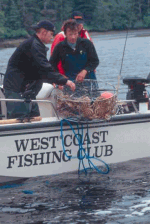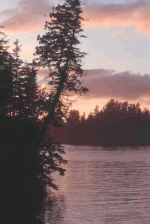written and photographed by Mary L. Peachin
Mar 2002, Vol. 6 No. 5
 Leaping out of the water, the humpback and her calf breeched a dozen times, each time slapping the water like a giant belly flop, one that could be seen and heard for miles. In the distance, we could see water spouts from other whales cruising the ocean water around Graham Island in the Queen Charlotte Islands. But, whale sightings were simply a sideshow for the dozen avid salmon anglers fishing the turbulent waters off the west coast of the northern-most island of British Columbia, the land of the Haida Gwaii.
Leaping out of the water, the humpback and her calf breeched a dozen times, each time slapping the water like a giant belly flop, one that could be seen and heard for miles. In the distance, we could see water spouts from other whales cruising the ocean water around Graham Island in the Queen Charlotte Islands. But, whale sightings were simply a sideshow for the dozen avid salmon anglers fishing the turbulent waters off the west coast of the northern-most island of British Columbia, the land of the Haida Gwaii.
The West Coast Fishing Club Outpost camp, 26 miles (as the helicopter flies) south of Masset, is tucked in the hillside high above the rugged coastline overlooking the protected natural harbor of Port Louis. This uninhabited area used to be the favorite grounds for commercial salmon fishermen. Renown for its deep water, a 1 1/2 mile ocean shelf with 200 foot ridges it is the perfect habitat for salmon runs passing Langara Island located off the north tip of Graham. This is their route to spawning grounds in the Skeena, Fraser, and Colombia River systems. Migrating through these waters, every third or fourth year the salmon head southward along the west coast of Vancouver Island, the mainland of British Columbia, and northern regions of the United States.
 In 1996 when Canada’s Department of Fisheries and Oceans threatened to close the season for fishing the prized Chinook salmon in the Queen Charlottes, Rick Grange, owner of the West Coast Fishing Club, concerned about the policy’s impact on his two lodges in Langara began a search for a location offering the same quality of fishing. Searching by boat he headed south of the boundary affected. When he discovered one of only three Crown leased properties on the west coast of Graham Island, he traced the ownership of a rustic cabin to a Haida artist in Masset. Granges’ original plan was to fly his Langara guests south to the Outpost by helicopter for the day so they could keep their salmon catch of Chinook. When the government abandoned the proposed restrictions, Grange decided to form a partnership with the Masset native and build a permanent camp.
In 1996 when Canada’s Department of Fisheries and Oceans threatened to close the season for fishing the prized Chinook salmon in the Queen Charlottes, Rick Grange, owner of the West Coast Fishing Club, concerned about the policy’s impact on his two lodges in Langara began a search for a location offering the same quality of fishing. Searching by boat he headed south of the boundary affected. When he discovered one of only three Crown leased properties on the west coast of Graham Island, he traced the ownership of a rustic cabin to a Haida artist in Masset. Granges’ original plan was to fly his Langara guests south to the Outpost by helicopter for the day so they could keep their salmon catch of Chinook. When the government abandoned the proposed restrictions, Grange decided to form a partnership with the Masset native and build a permanent camp.
In spring of ’99, a deal was made and together the two men hired a crew to drop 30 red cedar trees using 12×12 beams to build the luxurious Outpost. Located in Riddall Cove, the island’s natural harbor is surrounded by lava rocks covered with grass, ferns and the old growth spruce, hemlock, and fir of the rain forest. Mountain streams, filled with wild cutthroat trout, gush into the harbor. Rugged volcanic outcroppings, some landscaped with ferns and spruce trees, have names like Bronc and Laughing Horse.
Just getting to the Outpost is a thrill, a 20-minute flight or a heli-hop in a six passenger A-Star or 14 passenger Bell 212 from the village airport in Masset, the arrival point of a charter flight from Vancouver.
 Unloading from the helicopter, the first stop is the dry room to get outfitted in bright red survival floatation suits and rubber boots. Entry and exit to the docks is through this warm area where in “Ally McBeal” style men and women prepare for the elements. The suits provide warmth and dryness, and in the event of an emergency, flotation similar to a life vest.
Unloading from the helicopter, the first stop is the dry room to get outfitted in bright red survival floatation suits and rubber boots. Entry and exit to the docks is through this warm area where in “Ally McBeal” style men and women prepare for the elements. The suits provide warmth and dryness, and in the event of an emergency, flotation similar to a life vest.
Two to four anglers eagerly board guided 22-foot Boston Whalers, each motored with a 200 horsepower engine plus a less-powered trolling engine. Downriggers are used to troll as deep as 100 feet. Berkeley 10 1/2 ‘ foot rods and Islander MR2 “knuckbusters’ reels (so called because of the single action drag factor. If an angler doesn’t anticipate a run from a salmon, the handles of the reel will smash his knuckles. The rods with 25-pound test line are lowered to different depths, each baited with morsels of herring bait or assorted plugs including a salmon favorite “Tomic” or spoons.
“Americans called them kings, while Canadians call them springs, but the biggest of the salmon species are Chinooks. In the Queen Charlottes, most of the catch averages 25 pounds, 30 pounders, called “Tyee” are frequent. 40-60 pound fish are less frequently caught. Other species include the top running frisky fighting Coho salmon, and pinks. Chinook, tend to make several deep runs and sound heading toward the ocean depths. Occasionally, an angler will hook into a small halibut a 25-pounder called a “chicken”.
 In addition to whale sightings, yellow-beaked puffin and pigeon guillemot swim near the trolling boats. The dorsal fin of a Salmon sharks cuts through the water.
In addition to whale sightings, yellow-beaked puffin and pigeon guillemot swim near the trolling boats. The dorsal fin of a Salmon sharks cuts through the water.
Capt. Wayne McNaughton has 15 years of guiding experience, and his three years at the Outpost is invaluable in evaluating ocean conditions and knowing where rocks are barely covered below the surface during the flood of the tide.
Fishing partner, James Goldsmith from Bellevue, Washington is a happy angler. He lands his first tyee, a 34 pounder.
An alternative to salmon is halibut fishing and a 100 pounder is not an exception. Several miles from the Outpost bay is the “hali hole”, a 200 feet groove where halibut bury themselves in the sand. Heavier gear is used for hauling up these fish.
While most of the anglers head for the open water near Tian Point, a closer sight, which seems to yield less fish is called the Contour. Salmon fishing in the Charlottes is determined by the topography of the ocean bottom or sometimes “weed ” lines created by converging currents. The kelp provides cover and protection for bait on which the salmon feed.
In this “Galapagos of the North,” noted for indigenous species of birds without predators like grizzlies cougar, wolves, black-tailed Sitka deer abound. The black bear eat berries and feed on salmon in spring fed streams.
 Chef Grant MacPherson, formerly with the prestigious and historic Hotel Vancouver enjoys cooking the catch of the day (salmon, Ling cod, halibut, red snapper) supplied by the guests. “No one ever got tired of eating Dungeness crab here. With three crab traps, I have the luxury of serving it as much and as in many dishes as I want.” “These crab love to eat the heads of Chinook.” MacPherson doesn’t have a herb garden, but he does have a potato patch, and soon he’ll collect wild blueberries when they ripen. Cooking at the Outpost is a challenge of logistics. During the twice-weekly changeover, clients and luggage have priority over food on the helicopter. The Chef has to decide what he can live without for 3-4 days.
Chef Grant MacPherson, formerly with the prestigious and historic Hotel Vancouver enjoys cooking the catch of the day (salmon, Ling cod, halibut, red snapper) supplied by the guests. “No one ever got tired of eating Dungeness crab here. With three crab traps, I have the luxury of serving it as much and as in many dishes as I want.” “These crab love to eat the heads of Chinook.” MacPherson doesn’t have a herb garden, but he does have a potato patch, and soon he’ll collect wild blueberries when they ripen. Cooking at the Outpost is a challenge of logistics. During the twice-weekly changeover, clients and luggage have priority over food on the helicopter. The Chef has to decide what he can live without for 3-4 days.
As the angler sit around the living room wooding burning fireplace talking about their limits, a cozy setting with an open deck over looking the cove, Sitka deer graze while eagles fly back and forth. Some bide their cocktail time at the pool table, watching videos, or relaxing in the hot tub.
Phil Keele from Calgary tells a story of bringing a 40# Chinook to the boat. The fish decided to take another run and the side handles of reel whirred cutting his knuckles as the line snarled into a “birds nest.” Unable to reel the fish, Guide Matt Brown quickly cut the line from another rod and reel, and then held the line with the spent fish in his hand as he knotted the two lines together so Phil could land the fish.
Other activities include fresh water helicopter lake fishing from 12′ Jon boats with oars, scuba diving, and kayaking.
The Queen Charlottes is an island of extremes: rugged beauty, large fish, and harsh weather conditions. The Japanese current flows to depths of a mile and half and the ebb and flow of the tide creates nutrient rich upwelling. Teutonic forces, and a 8.1 earthquake in 1949, the epicenter in nearby Hippa Island, created some of the jagged glaciated rocks.
On our final day, gale winds were predicted and the swells appeared like rolling mountains with wind-aided chop. As I headed out with Coloradoans Bud Herskind and Mickey Jones, and guide Jerry Gagon from Massett, the rising tide waves crashed against the lava rocks of Bronc Island like a geyser, which then cascaded waterfalls. Hopefully, tomorrow would bring calmer seas for the incoming anglers.
For further information: e-mail [email protected] or go to www.westcoastfishing.com
